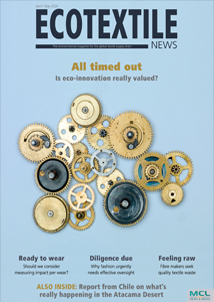WAKEFIELD – In the final episode in our five-part documentary series on textile-to-textile recycling, we get to hear from retailers Bestseller and Filippa K about how and why they are tackling the issue of circularity in their supply chains.
We also take to the streets of Brighton – a city with the only elected Green party MP in the UK – to find out if shoppers really are bothered about textile circularity and sustainable fashion in general.
Camilla Skjønning Jørgensen, sustainable materials & innovation manager at Bestseller, which has retail outlets in 45 countries and owns the Jack & Jones brand, tells us that for Bestseller, turning textiles into new textiles is vital for the group’s on-going sustainability strategy.
“Recycling is essential. This is how we see ourselves – using used textiles as a resource,” says Jørgensen, pointing out how it has also invested in technology companies such as Infinited Fiber and Evrnu in a bid to recover and re-use waste cotton and other types of cellulosic textiles.
“What we need to do first and foremost is to support these types of recycling technologies, so that then we can really scale up these processes,” she says, adding that Bestseller doesn’t want this to be a niche initiative, but for them to be operating at commercial scales.
It’s a view echoed by Jodi Evering, fabric, and sustainability manager at Swedish fashion brand Filippa K, which has been operating along these principles since the early 1990’s. “Keeping our things in use for as long as possible is key to sustainable consumption,” says Evering, who sources recycled fibres whenever possible – especially recycled wool from the Prato region of Italy.
However, she acknowledges that for a small or medium sized retailer such as Filippa K, getting hold of recycled fabrics has been a challenge if they don’t meet minimum order volumes. “As such, we’ve looked at aligning with other similar sized companies at early points in the supply chain for recycled materials,” she said, in order to provide more buying power for what can be scarce resources.
The final episode in this 5-part series also takes to the streets of Brighton to see what UK shoppers think about buying new clothes made from old textiles, if they’d be prepared to pay more for them, and what they think about sustainable fashion.
“What do you want me to do about all that stood here in Zara?” questions one young female shopper. “The fashion industry and manufacturers need to address that on our behalf.”
Subscribe to our podcasts and radio shows by following us on Apple, Google, Spotify and Amazon Music, to automatically get alerts when we launch a new Ecotextile Talks Behind the News podcast.















































